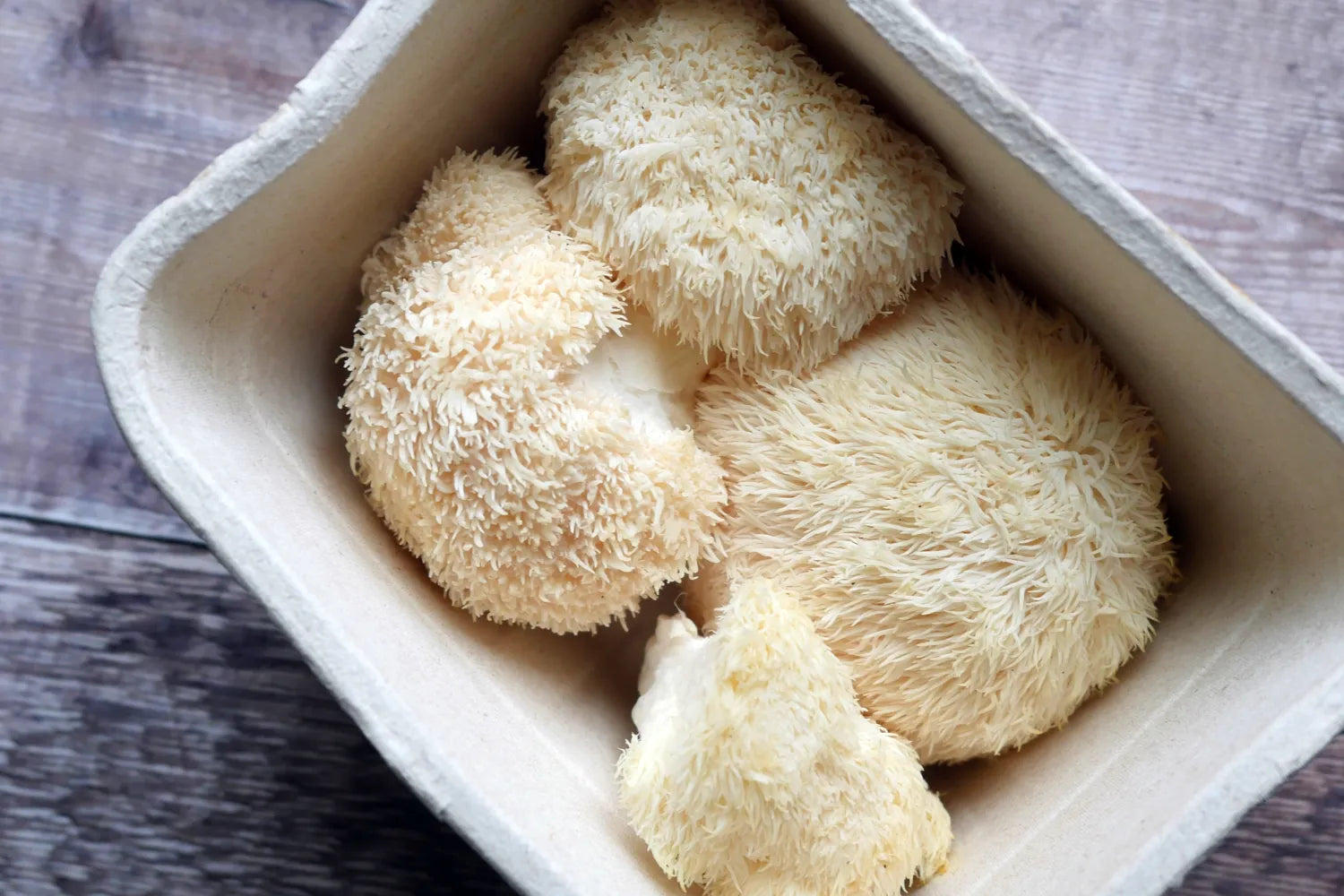The 6 Best Anti-Inflammatory Mushrooms

You might not think your bloating, achy joints, stubborn breakouts, and painful periods are connected, but you might want to think again. These are all possible symptoms of inflammation.
The good news is that inflammation might show up in lots of different ways, but there are also plenty of ways to help your body fight back. One easy way to support your body is by taking functional mushrooms. In this article, we’ll share the basics on inflammation, break down the top six anti-inflammatory mushrooms, and discuss how to use them.
What Is Inflammation?
Inflammation gets a bad rap, but it’s actually your body’s version of calling in reinforcements. When you get a cut, catch a virus, or even overtrain at the gym, your immune system sends in a response team of white blood cells, cytokines, and other helpers to repair damage and fight off invaders.
Inflammation might be hard to measure just by looking in the mirror, but it’s much easier to pin down with a little bit of blood work.
Some common markers for inflammation include the following:
- CRP (C-Reactive Protein): Indicates overall inflammation, and high levels may suggest chronic inflammation.
- IL-6 (Interleukin-6): A cytokine that rises during infection or chronic disease.
- TNF-α (Tumor Necrosis Factor-Alpha): Signals acute or autoimmune inflammation.
- ESR (Erythrocyte Sedimentation Rate): Measures inflammation speed in the body.
- IL‑1β (Interleukin-1 Beta): Triggers and amplifies the body’s inflammatory response, especially in chronic conditions.
Is All Inflammation Bad?
Here’s the truth: Inflammation isn’t always bad. In the short term, it’s essential for healing. It helps your body kill off bad bacteria, patch up injured tissue, and bounce back after stress.
But when inflammation sticks around too long, it stops being helpful and starts causing problems. Chronic inflammation has been linked to conditions like type 2 diabetes, arthritis, autoimmune disorders, and even cognitive decline.
When we look at inflammation, the goal isn’t to completely eliminate it. Remember, we need a healthy amount of inflammation for healing. However, it is important to keep chronic inflammation in check and help our bodies get back into a healthy rhythm.
6 Best Mushrooms for Inflammation
You might be wondering where to start when it comes to clearing up your inflammation. There are plenty of lifestyle changes that can help (and we’ll get to those at the end of the article), but one easy place to start is simply by adding a few more mushrooms to your diet.
1. Chaga
Chaga is not just a piece of mysterious-looking tree bark, although it might look like one. It's loaded with phenolic compounds that can help target inflammation. A 2022 lab study showed chaga extracts significantly reduced markers like nitric oxide, IL‑6, TNF‑α, and IL‑1β in immune cells activated to inflame.
That’s basically proof that it calms down inflammatory cells under stress. Other research confirms that its antioxidants and triterpenoids can lower gut and joint inflammation.
2. Reishi
Reishi, aka the “mushroom of immortality,” isn’t just hype. Studies show its polysaccharides help balance inflammatory cytokines like TH2 and TH1 types in both humans and animals.
Plus, its triterpenoids and antioxidants put out oxidative stress, which can contribute to inflammation if not kept under control. It’s backed by decades of research showing it supports immune stability, as well.
3. Lion’s Mane
Lion’s mane might be known for its brain-boosting abilities, but it can also calm down inflammation, especially around your gut and brain. For instance, studies found that its compounds lowered inflammatory markers like IL‑6 and TNF‑α in gastrointestinal tissue.
In simpler terms, it can help make digestion easier, quicker, and more comfortable. Plus, some research suggests it can also support good gut bacteria in humans, which can affect everything from inflammation and mental clarity to skin breakouts and mental health.
4. Turkey Tail
Turkey tail sounds a little like Thanksgiving leftovers, but its real strength is in its polysaccharopeptide (PSP/PSK) content. These compounds are famous for boosting immune cell responses and lowering inflammation.
In fact, Japan approves PSK as a complementary cancer therapy, thanks to its inflammation-moderating effects. By increasing helpful immune cells and moderating inflammatory signals, turkey tail can help you stay healthy for the long run. Can your Thanksgiving plate do that?
5. Shiitake and Maitake
Out of all the mushrooms on this list, shiitake and maitake are the ones you might recognize. While they’re commonly used in cooking, they bring anti-inflammatory perks. For instance, shiitake contains lentinan and beta-glucans that have been shown to lower markers like CRP in immune studies.
Maitake isn’t one to be outdone, though. It has polysaccharides that not only support immune health but also lower inflammation linked to metabolism. Both are tasty, easy to cook with, and backed by studies showing they calm inflammatory pathways. So maybe next time, order some mushrooms on your pizza!
6. Cordyceps
Cordyceps is a bit of a double whammy. Studies show cordycepin, its star compound, shuts down inflammatory signals in lab and animal models, even in fat cells.
It’s also praised for reducing lab markers linked to inflammation and supporting overall immune balance. Plus, it physically increases your body’s energy production, which makes it a great option for anyone looking to up their gains in the gym.
Can You Use Any Mushroom for Inflammation?
Not all mushrooms are created equal, and sadly, the button mushrooms in your grocery store salad bar probably won’t do much for inflammation. While those are tasty and nutritious, the real anti-inflammatory heavyweights are functional mushrooms like chaga, reishi, lion’s mane, turkey tail, and cordyceps. These varieties contain unique bioactive compounds — like beta-glucans, triterpenoids, and antioxidants — that go far beyond what regular culinary mushrooms can offer.
How To Use Anti-Inflammatory Mushrooms
Using mushrooms for inflammation isn’t just about tossing some powder in your coffee (unless you use the right one – hint, hint). Every brand of mushroom coffee out there has a different formulation made of different mushrooms and supporting ingredients. Basically, you need to do your research first.
The key here is consistency. Many of the studies on anti-inflammatory mushrooms involve daily use over several weeks or months.
You should also look for products that list the type of mushroom, whether they use mushroom fruiting bodies or mycelium, the extraction method (water, alcohol, or dual), and third-party testing for beta-glucans or active compounds. For example, studies often use doses of one to three grams of lion’s mane and around two to three grams of chaga per day.
How To Maximize Anti-Inflammatory Benefits
Taking mushrooms is a great place to start if you’re trying to lower inflammation, but to get the best results, you’ll need to look at some lifestyle factors. Think about it this way: If you’re still living a highly inflammatory lifestyle, then the most that mushrooms could do is help you feel a little better in the short-term. And if you’re reading this article, then you’re probably after long-term benefits.
Some lifestyle changes you might want to think about include the following:
- Eat an Anti-Inflammatory Diet: Load up on colorful veggies, leafy greens, berries, nuts, seeds, and omega-3-rich foods like wild salmon or chia seeds. Cut back on sugar, refined carbs, and processed junk.
- Prioritize Quality Sleep: Aim for seven to nine hours of solid rest. Poor sleep triggers inflammation and throws your immune system out of balance.
- Stay Hydrated: Water helps flush out toxins and keeps cells functioning properly. Add lemon or herbal tea for bonus benefits.
- Manage Stress Daily: Chronic stress can cause chronic inflammation. Try breathwork, meditation, journaling, or even a five-minute stretch break.
- Move Your Body Regularly: Exercise reduces inflammatory markers, but you don’t need to run marathons. Even walking, dancing, and gardening can help.
- Avoid Smoking and Limit Alcohol: Both increase oxidative stress and inflammation.
- Get a Little Sunshine: Natural vitamin D supports immune health — but don’t skip the sunscreen!
The Bottom Line
Inflammation isn’t always bad. In moderation, it’s your body’s way of keeping things in check. But when it sticks around too long, it’s time to call in the reinforcements.
Medicinal mushrooms like chaga, reishi, lion’s mane, and turkey tail offer natural, research-backed ways to support a balanced immune response. Combine them with smart lifestyle choices, and you may notice the benefits in no time. For more health tips and tricks, visit the Everyday Dose blog today.
Sources:
Lion’s Mane | LiverTox - NCBI Bookshelf
Immunomodulatory Properties of Coriolus versicolor: The Role of Polysaccharopeptide | FrontiersIn
Start your day
The Right Way









